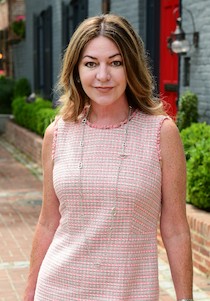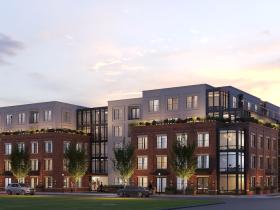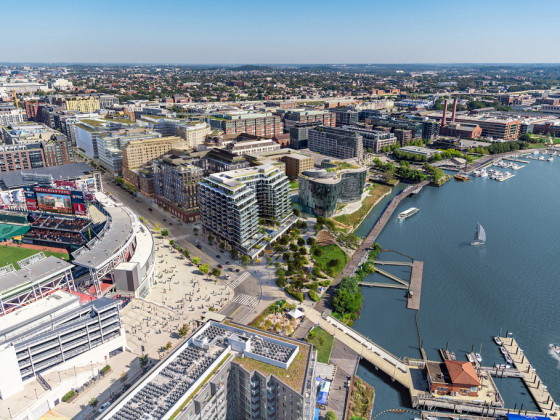What's Hot: Did January Mark The Bottom For The DC-Area Housing Market? | The Roller Coaster Development Scene In Tenleytown and AU Park
 From Seedy to Sought-After: Mount Vernon Triangle Becoming Urban Village
From Seedy to Sought-After: Mount Vernon Triangle Becoming Urban Village
✉️ Want to forward this article? Click here.
Mount Vernon Triangle: A Nexus Neighborhood in Need of Green
As part of UrbanTurf’s continuing partnership with The Washington Post, we published an article about Mount Vernon Triangle that ran this past Saturday in the Where We Live section. The article is reprinted below. All photos by Josh Howell. A few years ago, Mount Vernon Triangle was an area known for parking lots and prostitution. Today, it is a popular destination in the District for young home buyers, where new high-rise condos sit amid remnants of what was once an urban wasteland.
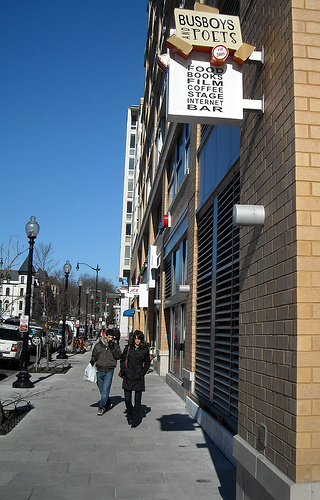
A couple strolls by the Busboy and Poets at CityVista
The neighborhood didn't happen by accident. In the early 2000s, the redevelopment of downtown and Penn Quarter was in full bloom, and builders were looking eastward for more opportunities. Underdeveloped but with great proximity to downtown and public transit, they turned to the area just east of Mount Vernon Square. In 2002, the city and developers launched an initiative to revitalize the area. The Mount Vernon Triangle Community Improvement District (CID), established in 2004, coordinates the initiative, provides community services like cleaning and safety, and markets the nascent neighborhood. Six years later, the housing inventory in Mount Vernon Triangle has grown from about 500 residential units to 2,000, effectively quadrupling the population of the neighborhood. The newcomers are largely young professionals drawn by convenient access to both downtown and Northern Virginia, where many of them work. Virginia Kromm, 29, bought a one-bedroom-plus-den at CityVista, a three-tower residential complex at Fifth and K streets NW, in September 2008. "I don't have a car, so when I was deciding on a place to buy, I realized that I could either go into the suburbs and then commute to work or I could live here, be close to restaurants and retail, and have some of the best access to public transportation in the city," Kromm said. Public transportation is a big selling point for Mount Vernon Triangle. The Gallery Place-Chinatown Metro station on the Red, Green and Yellow lines is an eight-minute walk from the heart of the neighborhood, and Metro Center on the Red, Blue and Orange lines is five minutes beyond that. The Circulator bus routes also run by, and access to I-395 is just a couple of blocks away. In addition to location, Mount Vernon Triangle's housing stock -- almost exclusively comprising condos such as Madrigal Lofts, The Sonata, 555 Mass. Ave. and Yale Steam Laundry -- attracts residents with plentiful amenities and services. Lister Lim, 34, who bought a one-bedroom at Yale Steam Laundry in 2007 after living near Gallery Place for two years, explained that the growing options for shopping and restaurants were what sold him. "The quality of life here is great," Lim said. "Nightclubs and restaurants are regularly opening up, and there is talk of building hotels and more shops. I hang out a lot with the people in my building. It sometimes feels like a dorm."
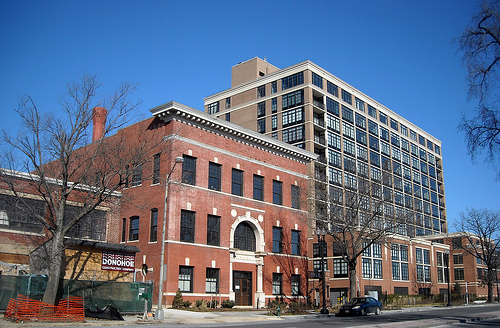
Yale Steam Laundry
Most of the neighborhood's amenities are at the ground level of CityVista, the area's largest development, with 224 rental apartments and 441 condominiums. The "urban lifestyle" Safeway at the northwest corner of CityVista (dubbed by the supermarket company because of amenities such as a nut bar and open-flame hearth oven) is the neighborhood's popular grocery, while the coffee shop-restaurant Busboys and Poets and trendy deli Taylor Gourmet sit around the corner on K Street. The ground floor is rounded out with a hardware store, bank, and Results Gym. "Compared to other new neighborhoods in the city, Mount Vernon Triangle offers a lot," said Paul Sieczkowski, founder of the Triangle, a neighborhood blog. "If you went to the ballpark neighborhood or NoMa, you would find that the amenities are pretty scant." CID Executive Director Bill McLeod notes that rampant prostitution was a big problem in this area a few years ago, and the CID worked to curb the activity and hired police officers to patrol the streets on Thursday, Friday, and Saturday nights. "Most of the prostitution is gone now," he said. "It has improved so much people don't complain about it anymore." Other crime in the neighborhood is relatively light. "Cars getting broken into is probably the most prevalent crime," explained McLeod. "Everything in your car has to be out of sight when you park or you could be the victim of a smash-and-grab." These days, the Mount Vernon Triangle scuttlebutt is less about crime and more about development -- or lack thereof. The economic downturn has stalled the neighborhood's momentum. "Change in the community is not happening as fast as we were hoping two or three years ago," McLeod said. "There are still seven large empty parcels that are all spoken for, but plans for them have been put on hold."
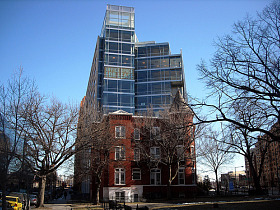
5th and Massachusetts Ave NW
That said, progress in the neighborhood hasn't come to a complete standstill. Henry's Soul Café, a soul food restaurant with a location on U Street, just opened at 317 K Street, and residents are excited by the Parisian bar-restaurant franchise Buddha Bar coming to Massachusetts Avenue, as well as Kushi, a Japanese restaurant that will be another tenant of CityVista. Both are expected to open this year. Residents are also watching for news on the fate of the Dumont, a two-tower, 559-unit residential project at Fourth Street and Massachusetts Avenue. Delivery of the project, which had been scheduled for 2008, was a widely reported fiasco -- all deposits were returned to would-be buyers and the project was pulled off the market. It has sat vacant ever since. There have been rumblings that The Dumont could be reintroduced sometime in 2010, a possibility that would add at least another 500 people to the neighborhood. "As of the first of the year, fewer than 100 new units will be available and all one-bedroom units are projected to be gone by March," said David Mayhood, president of the Mayhood Company, which markets and sells condos. "With no new condominiums under construction, the current inventory will be gone by mid to late 2010." Mayhood said the lack of new inventory and continued demand will result in higher prices in the coming months. Currently, one-bedroom condos in the Mount Vernon Triangle area start at around $330,000 and two-bedrooms start around $420,000. Looking beyond 2010, the new D.C. streetcar is planned to run down K Street. Track construction has yet to start, but K Street is in the first phase of the streetcar build-out plan, and it is an extension of the H Street line, where construction is well underway. "K Street will be our thoroughfare, with a streetcar running down it and retail and restaurants on either side," McLeod said when asked to imagine the Mount Vernon Triangle of 2020. "Every parcel will be built out, and we'll have a dense, active neighborhood."
See other articles related to: dclofts, editors choice, hoods, mount vernon triangle, the washington post, where we live
This article originally published at https://dc.urbanturf.com/articles/blog/from_seedy_to_sought-after_mount_vernon_triangle_becoming_urban_village/1734.
Most Popular... This Week • Last 30 Days • Ever

As mortgage rates have more than doubled from their historic lows over the last coupl... read »

The small handful of projects in the pipeline are either moving full steam ahead, get... read »

Lincoln-Westmoreland Housing is moving forward with plans to replace an aging Shaw af... read »

The longtime political strategist and pollster who has advised everyone from Presiden... read »

A report out today finds early signs that the spring could be a busy market.... read »
DC Real Estate Guides
Short guides to navigating the DC-area real estate market
We've collected all our helpful guides for buying, selling and renting in and around Washington, DC in one place. Start browsing below!
First-Timer Primers
Intro guides for first-time home buyers
Unique Spaces
Awesome and unusual real estate from across the DC Metro

